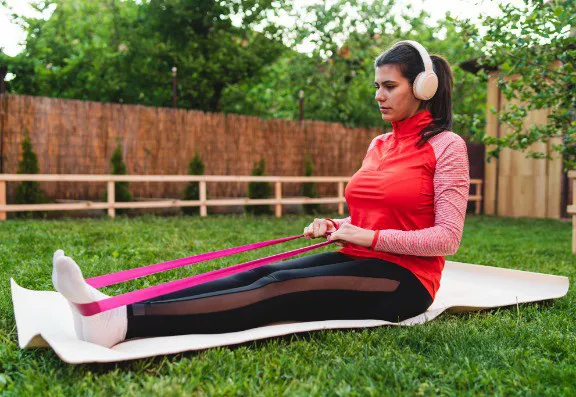Maintaining health and fitness when you’re going through menopause is extremely valuable in helping to minimise symptoms and reduce weight gain.
As a result of fluctuating hormone levels, it’s normal for menopausal women to gain weight – particularly around their stomach – while disturbed sleep, low mood and hot flushes all make it harder to eat well and exercise regularly.
There’s no fad diet that will help you lose or maintain your weight through menopause. A balanced diet, whereby you eat a variety of food in the right proportions, will stand you in good stead.
The NHS advises that you should:

According to the British Dietetic Association, we should aim for two to three portions of calcium-rich foods a day. These can include:
The British Dietic Association also advises on good foods for menopausal women to eat and those to avoid to maintain heart health. Guidance includes:

Staying fit and healthy is really important for women going through menopause. Exercising can help you as it will:
Cardiovascular
Get your blood pumping to support your heart health through some cardiovascular exercise. You can try brisk walking, swimming running, cycling, dancing, and high-intensity interval training (HIIT).
Strength
Focus on building your bone and muscle strength with weight training. Start with using your own body weight by doing planks, squats and lunges. You can also use the resistance-based equipment available in most gyms. Once your strength improves, you can start lifting weights such as dumbbells and kettlebells.
If you’ve never done strength training before, speak to a qualified expert to guide you safely. Weightlifting can cause injury that can put you out of action for months.
Balance and Mobility
Getting older means you’re more at risk of falls, while a lack of bone strength means you’re more prone to breaks and fractures.
Try yoga, pilates or tai chi to help with your balance and mobility. These types of exercises really make you focus, so are great for reducing stress too.
If you’ve never exercised before, it’s important to get your body moving and gradually introduce exercise to your lifestyle so you don’t injure yourself by going too hard and fast. When you’ve built up good mobility, the NHS recommends:
Improving your diet and exercise routines will have a hugely positive impact on your journey through menopause. Eating healthily and moving regularly will help ease menopause symptoms and enable you to live an active and enjoyable life for longer.
As always, if you have any questions you can use our Menopause Q&A where you can ask for more advice.
We have lots of Menopause FAQs, Menopause videos, Menopause reviews, and Menopause before and after images for you to do more research.
If you want to look for your nearest verified Menopause clinic, your local menopause clinics are listed below.